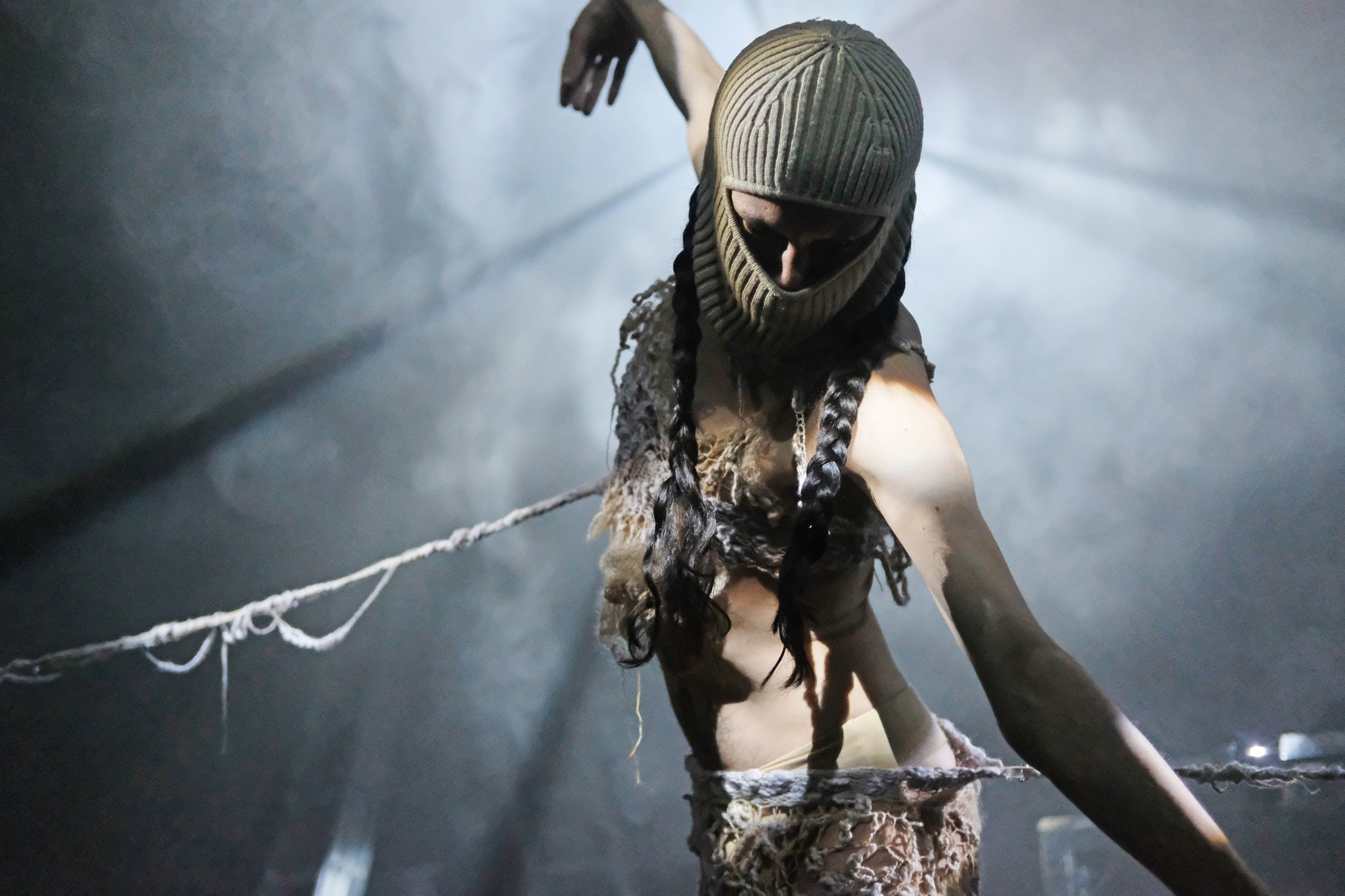Words by Paula Catalina Riofrio.
I recently found an article that described in perfect terms what diaspora means. Here is the translation from Spanish into my own words: “Diaspora comes from a Greek word which means ‘dispersion’. It refers to the individuals or members of certain groups that have left their countries of origin but maintain a bond with them.”
Expanding on this, co-founder of Diasporas Now Rieko Whitfield told me on a call: “The other day I had some curators come by for a studio visit and they were asking me what diaspora means at the moment. You can say Global Majority or non-Western. You can be Paraguayan, you can grow up here or move from Tanzania or move from Japan. But really it’s an amalgamation of experiences and a really rich place to create new languages, conceptions, spiritualities and rituals.”
Valerie Asiimwe Amani, Bakani Pick-Up, ZINZILE and Pierre are all movement-based artists from Diasporas Now – a platform for expanded performance by the Global Majority founded by Rieko Whitfield, Paola Estrella and Lulu Wang in 2021 at the Royal College of Art.
Through a beautiful conversation that I had with them over Zoom a few weeks ago, they explained the connections between their creative process, their roots, and their experiences of the Diasporas Now U.K. Tour 2023-2024 at NN Contemporary Art, Humber Street Gallery, and the Institute of Contemporary Arts.
Paula: What does choreography mean to you in a wider context of your artistic practice?
Valerie: I used to dance, and trained in modern and contemporary dance, but then I stopped dancing somewhere in my mid 20s. Then coming back to Visual Arts, I realised through writing that movement is also language, and I don’t know when I lost that language. Somehow my practice has been a process of refining that language and I think movement goes beyond, like there’s something that’s beyond words, and it’s a very innate human thing. Humans are just so attracted to each other’s movement, you are immediately compelled to watch a body move. I think there is something that dissipates barriers. There’s something that people have to become vulnerable to.
Bakani: I think also for me, culturally, movement feels central to everything. A lot of my fondest and earliest childhood memories are from family barbecues, Christmases or just a Saturday or cleaning day in the house, you know, with the music blasting. So, for me, this coming together of music, the body and other activities has always been something that’s been a part of my life.
I’ve kind of gotten older and experienced the world a little bit more. I am actively searching for moments or situations where it can be identified as an act of choreography: like street lamps that are all completely, you know, symmetrical, or, you know, birds flying altogether. Choreography drove me towards looking more at how we as people function in almost a choreographic way, from getting up, turning the alarm off, getting out of bed, brushing your teeth, having breakfast, leaving the house or actually dancing in a studio space. I’ve just been drawn towards people’s ways of being.
I started going down this road of research to think about how an improvisation practice can facilitate ways of being also within a dance space. And then how do all the other life experiences feed into my Zimbabwean heritage; how does my interest in hip hop or soul music or just existing come together to create a dance. And, then, what is dance?
While I was on the call with Pierre they were facing one of those issues that arrive in adulthood, one of those related to career and lifepaths. I took the liberty to scribble a poem out of Pierre’s answer. It sounds to me like the voices of friends abroad, like mine has sounded on the other line of a phone call:
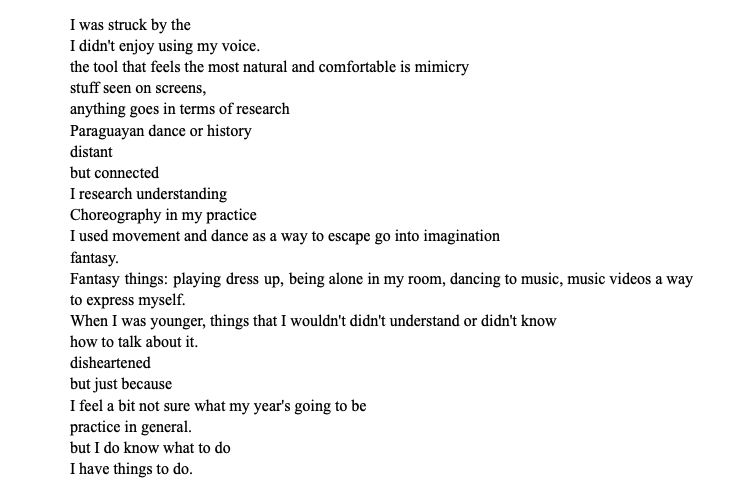
ZINZILE: To give context I have a BA in dance, contemporary dance. And I’ve always had a vision of being a choreographer since being young. And I feel that my perception of choreography is very different to the reality that I’m currently dealing with. I don’t feel the need to try to put choreography in a box, but where I am right now is definitely coming more from a spiritual place where improvisation is at the heart of the practice. I find a lot of my inspiration from just observing people as they are.
At the same time, choreography is really me. Coming back to myself and coming back to the realness of life, as I feel there can also be a lot of performativity within my experience with dance. I’m not saying the word performativity in any positive or negative way, I just think it’s important to have some intentionality behind that performativity, if it is there, which I like to play into. It feels like this conversation of stripping back to real world vulnerability and then playing into something, which is really fun to explore. I feel choreography is a way of storytelling which I can only understand retrospectively. It really feels like a divine process for me right now.
Paula: What does it mean to work in expanded performance as a diasporic artist?
Valerie: A lot of my work centres on how to be invisible in the institution or the rebellion of being categorised. As part of that, I’m reflecting back to the way that we used to record things i.e., oral history where stories or rituals were passed on from person to person. It wasn’t recorded, wasn’t scrutinised in the same ways today. It wasn’t studied in the colonial lens. And I think with performance, what I really love about it is this kind of temporality, and also the impermanence in a way that it can’t be held. It happens in a moment and then it’s gone, but the people who experienced it can carry it in that kind of essence of storytelling. When I think about things that we do or rituals or things I will take in from my memories of my grandmother, these things are not tangible. I think I’ve been sitting with that a lot in terms of what does it mean to make artwork that doesn’t last forever?
Bakani: There is a kind of third identity or sense of self that I’ve ended up discovering or that I am now, which is directly born out of my practice. I left home when I was 11 years old and moved here to the UK. A lot of things that were normal like dancing, all of a sudden became something with currency and profitability here in the UK. That didn’t really feel like the relationship that I had with dance, because all of a sudden, it felt like if you wanted to dance you had to pay to go to a dance class or you have to go to a youth centre or after school clubs. What was lost was that sense of community.
But the whole reason for dancing is for quality of life and the quality of our present. And so I lost that as I was assimilating into British culture. And then only really since lockdown have I been able to look back and fall into nostalgia. I think that ties in with me beginning a therapeutic journey, recognising the more internal childhood experiences, embracing that little 11 year old boy, and realising that, you know, equally as I am now, I’m also that version of myself.
Those rhythms and that way of being has always been a part of me and is a part of me. It’s not about one or the other, but actually it’s about bringing the two together, and then all of a sudden recognising that actually choreographically and within an artistic practice, it’s much more chaotic because there’s so many things happening. Within that I’ve then been able to find lived experiences of the every day that are attached to a sense of joy and self. That feels like where the magic really happens, when you get to just be yourself and all of your life experiences meeting in that dance or movement.
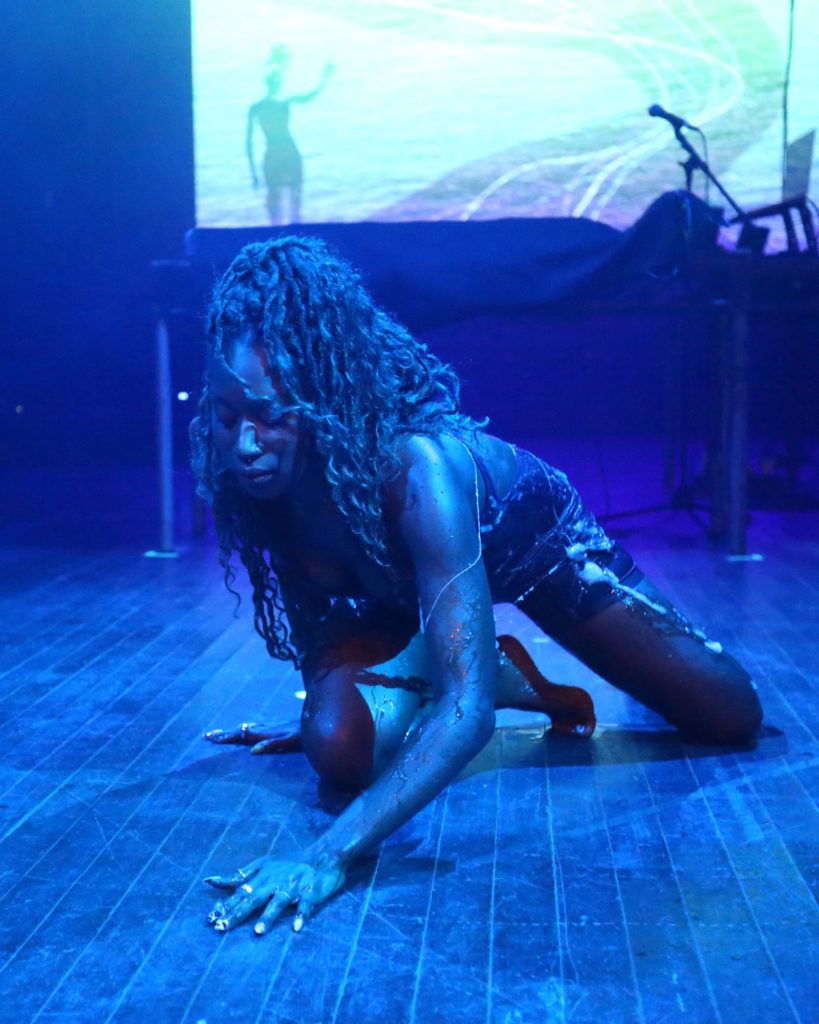
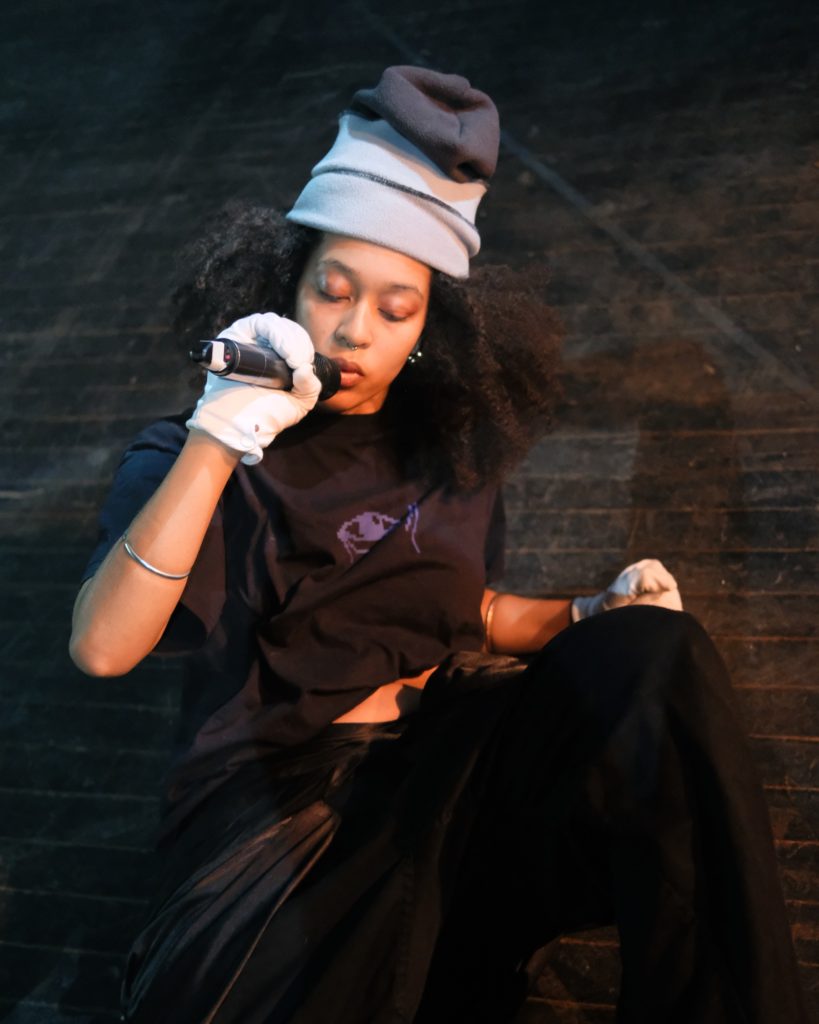
Pierre: Working in expanded performance as a diasporic artist is a jumble. It’s like a jumble of feeling inauthentic, trying to find understanding in it. And I think for me queerness is always present, and how I embody or physicalise queerness and not take a binary approach.
ZINZILE: For me being someone who is of mixed heritage, there’s this extra layer of, in quotations, “not fully belonging anywhere.” My mom is Black, South African, and my dad is a mixture of three different types of white: English, Italian and Scottish. My practice as a whole has very much been an integration of that internal war between two races and having to embody and accept the coloniser part of me and technically the oppressed part of me, and making peace with that. This has been an ongoing process and it comes through in different ways.
I’ve found a lot of peace and I’m still very much exploring my South African heritage and context in my work. When it comes to heritage, I feel like I go for a more Pan-African approach and feel very influenced by an Afro-futuristic approach in terms of creating new realities. I really think Afrofuturism can extend beyond the African diaspora. It’s this sort of transmutation of difficult circumstances and making it into a utopia for yourself.
I feel in my practice as a whole that music and dance are weaving together. I feel less of a need to separate music and dance, and I think a platform like Diasporas Now has helped me with this. At the moment my practice is heavily inspired by different ceremonies practised throughout different cultures as a way of finding collective healing through dance and through music, and how there is no real separation between dance and music.
I also think history always looks sweeter than it is. And one day we’re going to be somebody’s ancestors, whether we have children or not. In my times of doubt, I think about what legacy I’m leaving behind for those future people who can connect with me in some sort of way.
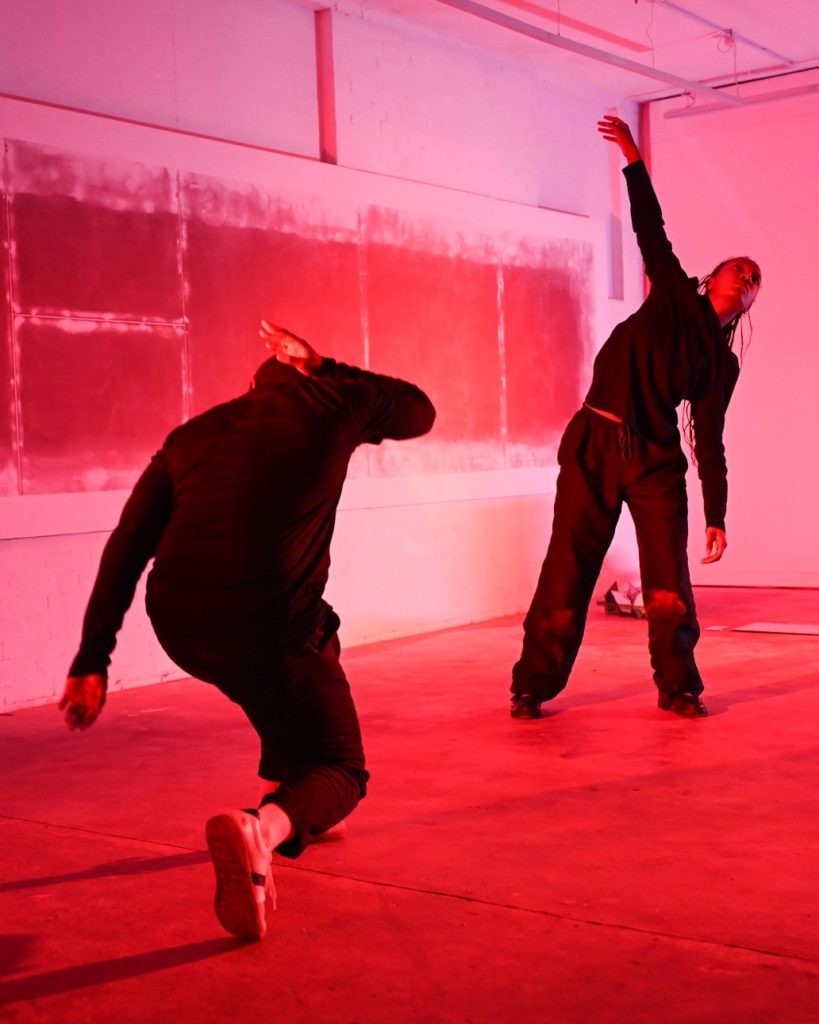
During our Zoom conversation there were so many meaningful layers of vulnerability and poetry distilled from experiences. I invited them to share some of their writing. This is what they sent for us. Here is the poem written by Valerie:
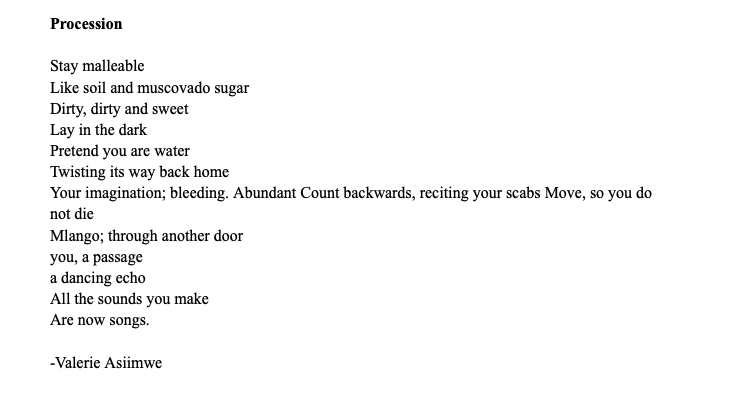
Here is a text choreographed, meaning and rhythm, by Bakani:
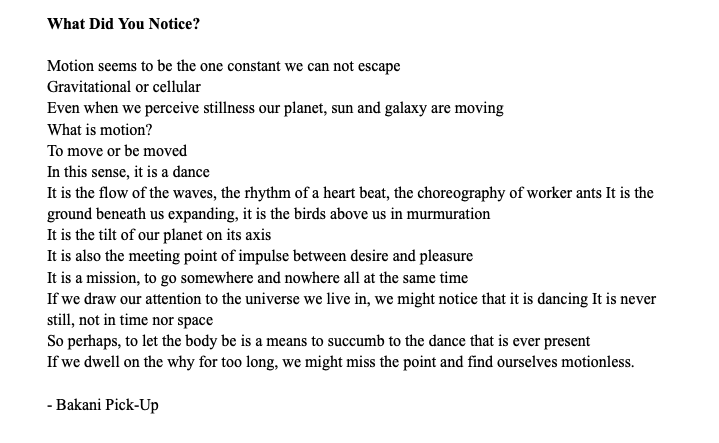
The conversations I had with Diasporas Now clarified to me the infinite ways of language and imagination. It left me wondering, what are the bonds I hold onto? Why do I hold onto them and how present are they in my day to day? I would love to think about their connection to my art practice, but many times the day runs short for what is really important.
I invite you, reader, to have time away and remember to love and honour those connections you have to what is dearest to you.
We’re an independent dance magazine that currently runs on a voluntary basis. If you’d like to support us, you can do so here.
